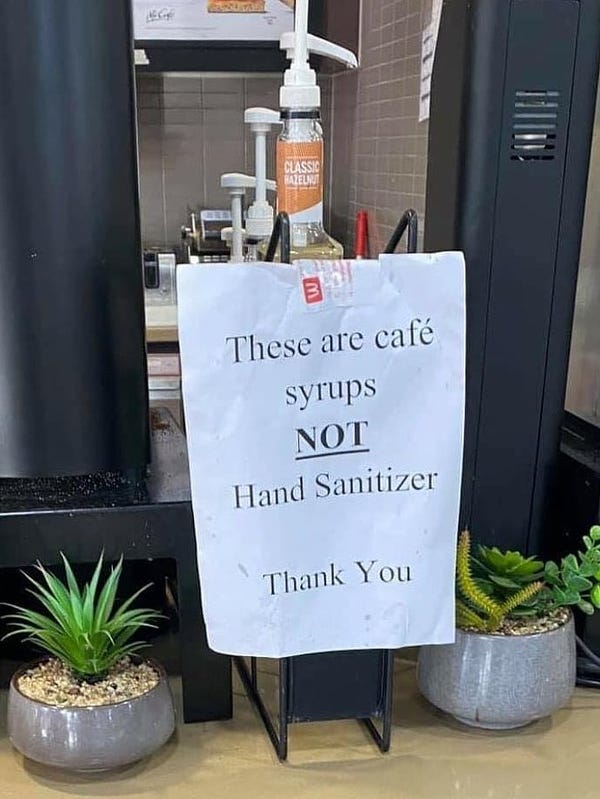Delivery app shenanigans, Flavortown, and saving America's lesbian bars
Issue 176: Here's a short roundup of food articles worth your time this Wednesday afternoon.

Hello! Welcome to Nosh Box, a lunchtime-ish food newsletter that’s been doing a lot of reading lately as a way to avoid real work. So today, I figured I’d share a roundup of stories I’ve seen that I think are worth checking out to stay informed.
Read yesterday’s dispatch: The next pollinator technology? Blowing bubbles
Food delivery apps like Postmates and Grubhub have been ignoring local legislation aimed at preventing exorbitant commission fees, according to The Counter. In response to concerns that high fees were bad news for restaurants at a time when their survival depended on takeout/delivery, many cities around the country capped the fees apps can charge. Some apps responded by hiking customer fees, shrinking delivery zones, or even pretending that regulations are too confusing for them to understand. In DC, Postmates is straight-up ignoring the fee cap. And in San Francisco, Grubhub informed restaurants that the fee cap was expiring when restaurant dining reopened — even though the city had specifically said that was not the case.
Over 80,000 people have signed a petition to rename Columbus, Ohio, “Flavortown” in honor of Guy Fieri, who was born there. Guy Fieri: Bad at restaurants, Good at being a solid dude who highlights immigrant-owned mom-and-pop shops and cooks for people in need (even if he presents a hypermasculine, sometimes-exoticizing viewpoint). Columbus, of course, is currently named after Christopher Columbus, who was not a solid dude, to say the least.
In the Change.org petition description (which you can sign here, hint, hint), the creator, Tyler Woodbridge, writes:
Why not rename the city Flavortown? The new name is twofold. For one, it honors Central Ohio’s proud heritage as a culinary crossroads and one of the nation’s largest test markets for the food industry. Secondly, cheflebrity Guy Fieri was born in Columbus, so naming the city in honor of him (he’s such a good dude, really) would be superior to its current nomenclature.”
He’s delivering the petition to city hall on Tuesday.
As schools go virtual amid the pandemic, students whose parents are migrant workers have been pulled onto the fields at the expense of their school work, Elizabeth Aguilar reports for The Counter.
“The law says students can’t work during school hours, but there are no hours going on right now so many of them are working,” said Kendra Moesle of the Association of Farmworker Opportunity Programs and Children in the Fields Campaign. “It’s really going to impact education because they are not focusing on school work and, secondly, there is the physical danger.”
Only around 16 lesbian bars remain in the U.S., and they’re increasingly vulnerable to Covid-19, Meghan McCarron reports at Eater. Julie Mabry, of Pearl Bar in Houston, has begun loosely organizing lesbian bar owners around a hashtag, #SaveTheLastLesbianBars, where she’s working to drum up community support and celebrity endorsements.
Every November, Cherokee chef Nico Albert redesigns the menu at her Tulsa, Oklahoma, restaurant to feature Native American ingredients in dishes like persimmon frybread pie, sweet corn hazelnut sauce, pickled blueberries, and more.
But now, with chef Taelor Barton, also a member of the Cherokee Nation of Oklahoma, Albert has been working on a more ambitious project: researching, restoring, and revitalizing ancient Cherokee foodways, some of which haven’t been practiced since well before European colonization of the Americas. The chefs are working with archaeologists and other researchers to not just introduce Indigenous ingredients into modern recipes but truly understand the development of agriculture in Appalachia over the past 5,000 years.
Osayi Endolyn close-reads the NYTimes article on “difficult” Thai fruit…
In the New York Times on Monday, Hannah Beech wrote an article ostensibly about fruits in Thailand, but it repeatedly emphasizes the negatives elements of the fruit in a way that seems opinionated, stereotypical, and ultimately sort of… fruitless, if you will. Writer Osayi Endolyn breaks down the examples of how Beech, rather than doing fact-based reporting, inserts a colonializing and America-centric perspective.
I think it’s important to examine writing (both good and bad) this closely for a variety of reasons, but the lessons Endolyn draws from this particular article are vital for readers AND writer AND editors thinking about the connections between racism and food media.
You’ll need an Instagram account to watch her story, which you can access by clicking the link in this tweet:


Today in the Department of Signs That You Just Know Have a Story Behind Their Existence…
And an interesting event tomorrow night…

That’ll do it for us here at Nosh Box today. See you tomorrow!






